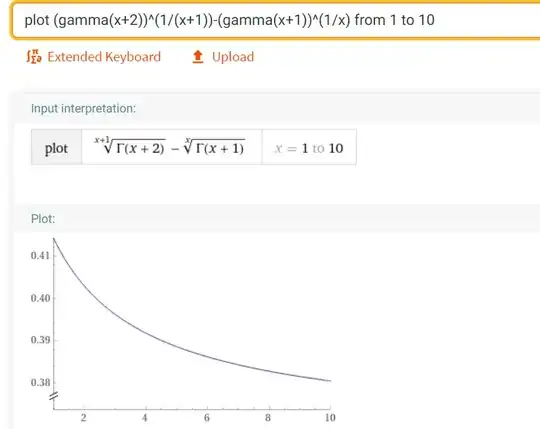Sketch of a proof:
Let $f(x) = \Gamma(x + 1)^{1/x}$.
We have
$$f''(x) = \frac{\Gamma(x + 1)^{1/x}}{x^2}
\left[x\psi'(x + 1) - 1 + \left(\frac{\ln \Gamma(x + 1)}{x} + 1 - \psi(x + 1)\right)^2\right]$$
where $\psi(\cdot)$ is the digamma function defined by $\psi(u) = \frac{\mathrm{d} \ln \Gamma(u)}{\mathrm{d} u} = \frac{\Gamma'(u)}{\Gamma(u)}$.
Fact 1: $f''(x) < 0$ for all $x \ge \frac25$.
(The proof is given at the end.)
Fact 2: $f''(x) < 0$ for all $0 < x < \frac25$.
(The proof is given at the end.)
From Facts 1-2, we have $f''(x) < 0$ for all $x > 0$, and the desired result follows.
We are done.
Proof of Fact 1:
It suffices to prove that, for all $x \ge \frac25$,
$$x\psi'(x + 1) - 1 + \left(\frac{\ln \Gamma(x + 1)}{x} + 1 - \psi(x + 1)\right)^2 < 0.$$
Fact 3: $\psi(u) > \ln u - \frac{1}{2u} - \frac{1}{12u^2}$ for all $u > 0$.
(See: Theorem 5, [1].)
Fact 4: $\psi'(u) < \frac{1}{u} + \frac{1}{2u^2} + \frac{1}{6u^3}$ for all $u > 0$.
(See: Theorem 4, [1].)
Fact 5: $\Gamma(x) \le \sqrt{2\pi}\, x^{x - 1/2}\mathrm{e}^{-x} \mathrm{e}^{\frac{1}{12x}}$
for all $x > 0$.
Fact 6: $\frac{\ln \Gamma(x + 1)}{x} + 1 > \psi(x + 1)$ for all $x > 0$.
(The proof is given at the end.)
By using Facts 3-6, it suffices to prove that
\begin{align*}
&x\cdot \left(\frac{1}{x + 1} + \frac{1}{2(x + 1)^2} + \frac{1}{6(x + 1)^3}\right) - 1 \\
& + \bigg[\frac{\ln \left(\sqrt{2\pi} (x + 1)^{x + 1/2}\mathrm{e}^{-x - 1} \mathrm{e}^{\frac{1}{12(x + 1)}}\right)}{x} + 1 - \bigg(\ln (x + 1) - \frac{1}{2(x + 1)} - \frac{1}{12(x + 1)^2}\bigg)\bigg]^2\\
&< 0
\end{align*}
or
\begin{align*}
&\ln \left[\sqrt{2\pi} (x + 1)^{x + 1/2}\mathrm{e}^{-x - 1} \mathrm{e}^{\frac{1}{12(x + 1)}}\right] + x - x\bigg(\ln (x + 1) - \frac{1}{2(x + 1)} - \frac{1}{12(x + 1)^2}\bigg)\\
&< x\sqrt{\frac{3x^2 + 8x + 6}{6(x + 1)^3}}
\end{align*}
or
\begin{align*}
\ln \sqrt{2\pi} - 1 + \frac{1}{2}\ln(x + 1)
+ \frac{6x^2 + 8x + 1}{12(x + 1)^2}
- x\sqrt{\frac{3x^2 + 8x + 6}{6(x + 1)^3}} < 0.
\end{align*}
Denote LHS by $g(x)$. We have
$$g'(x) = \frac{3x^2 + 8x + 6}{6(x + 1)^3}
- {\frac {3\,{x}^{3}+12\,{x}^{2}+18\,x+12}{6\,{x}^{3}+22\,{x}^{2}+28\,x+
12}}
\sqrt{\frac{3x^2 + 8x + 6}{6(x + 1)^3}}.$$
It is easy to prove that $g'(x) < 0$ for all $x > 0$.
Also, $g(2/5) < 0$. Thus, $g(x) < 0$ for all $x \ge 2/5$.
We are done.
Proof of Fact 6:
It suffices to prove that, for all $x > 0$,
$$\ln \Gamma(x + 1) + x - x \psi(x + 1) > 0.$$
Denote LHS by $h(x)$. We have
$$h'(x) = 1 - x\psi'(x+1)
> 1 - x \cdot \left(\frac{1}{x + 1} + \frac{1}{(x + 1)^2}\right) > 0$$
where we have
used $\psi'(u) \le \frac{1}{u} + \frac{1}{u^2}$ for all $u > 0$. Also, $h(0) = 0$. Thus, $h(x) > 0$ for all $x > 0$.
We are done.
Proof of Fact 2:
It suffices to prove that, for all $0 < x < \frac25$,
$$x\psi'(x + 1) - 1 + \left(\frac{\ln \Gamma(x + 1)}{x} + 1 - \psi(x + 1)\right)^2 < 0.$$
Fact 9: $\psi'(x + 1) \le \sum_{k=0}^6 \frac{x^k}{k!}\psi^{(k + 1)}(1)$ for all $x > 0$.
(Remarks: I will add the proofs of Facts 9-11 in the future.)
Fact 10: $\psi(x + 1) \ge \sum_{k=0}^6 \frac{x^k}{k!}\psi^{(k)}(1)$ for all $x > 0$.
Fact 11: $\ln\Gamma(x + 1) \le \sum_{k=1}^6 \frac{x^k}{k!}\psi^{(k - 1)}(1)$ for all $x > 0$.
By using Facts 9-11 and Fact 6, it suffices to prove that
\begin{align*}
x \sum_{k=0}^6 \frac{x^k}{k!}\psi^{(k + 1)}(1) - 1 + \left(\sum_{k=0}^5 \frac{x^k}{(k + 1)!}\psi^{(k)}(1) + 1 - \sum_{k=0}^6 \frac{x^k}{k!}\psi^{(k)}(1)\right)^2 < 0
\end{align*}
that is
$$\frac{x^2}{514382400}(q_{10}x^{10} + q_9 x^9 + \cdots + q_1x + q_0) < 0 \tag{1}$$
where
$q_{10} = 514382400[\zeta(7)]^2, \cdots, q_0 = 3572100\pi^4 - 342921600\zeta(3)$.
One can prove that (1) holds for all $0 < x < 2/5$.
We are done.
References
[1] L. Gordon, “A stochastic approach to the gamma function”, Amer. Math. Monthly, 9(101), 1994, 858-865.
